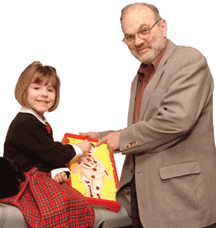 As the pediatric neurosurgical referral center for a large part of the western United States, The Children’s Hospital’s pediatric neurosurgeons and staff care exclusively for infants, children and adolescents undergoing complex brain and spinal cord surgery. In 2001, Drs. Michael Handler and Lori McBride served as the neurosurgical leads for the separation of the conjoined Stark twins. In collaboration with the pediatric Neurology team, Neurosurgery offers integrated, comprehensive treatment for all types of disorders affecting the nervous system and cranial vault. The initiation of the Surgical Epilepsy Program offers the region’s only comprehensive treatment program for chronic seizure disorders. Brain Lab® image-guided endoscopy allows neurosurgeons to perform complex brain surgeries through relatively small openings in the skull. The development of the Neuro-oncology Program will result in the region’s first pediatric Neurofibromatosis Clinic in early 2003. The Craniofacial Clinic treats a wide range of both congenital and traumatic abnormalities.
As the pediatric neurosurgical referral center for a large part of the western United States, The Children’s Hospital’s pediatric neurosurgeons and staff care exclusively for infants, children and adolescents undergoing complex brain and spinal cord surgery. In 2001, Drs. Michael Handler and Lori McBride served as the neurosurgical leads for the separation of the conjoined Stark twins. In collaboration with the pediatric Neurology team, Neurosurgery offers integrated, comprehensive treatment for all types of disorders affecting the nervous system and cranial vault. The initiation of the Surgical Epilepsy Program offers the region’s only comprehensive treatment program for chronic seizure disorders. Brain Lab® image-guided endoscopy allows neurosurgeons to perform complex brain surgeries through relatively small openings in the skull. The development of the Neuro-oncology Program will result in the region’s first pediatric Neurofibromatosis Clinic in early 2003. The Craniofacial Clinic treats a wide range of both congenital and traumatic abnormalities.
Ken Rose Winston, MD
Chairman
with six-year-old Maggie
 Programs and Clinics
Programs and Clinics
A collaboration between Neurosurgery and Neurology, the Surgical Epilepsy Program uses aggressive monitoring and operative procedures to treat chronic seizure disorders. The surgical team is one of the first groups in the nation to implant the new vagus nerve stimulator in young epileptics. With an integrated team approach that includes the epileptologists in Neurology, surgical interventions can be coordinated with medication regimens to produce better results than either treatment can on its own.
The Neuro-oncology Program treats childhood brain tumors through a multidisciplinary group including pediatric neurosurgeons, pediatric oncologists, pediatric neurologists and radiation oncologists. Through the affiliation with the University of Colorado Health Sciences Center, Linac stereotactic radiosurgery is available for the treatment of pediatric brain and spinal tumors. The advanced linear accelerator (Linac) delivers a one-time, extremely precise high-dose radiation to brain lesions, targeting tumors while preserving the healthy surrounding tissue.
The Craniofacial Clinic is a partnership between Plastic Surgery and Neurosurgery. The clinic treats congenital and acquired deformities of the craniofacial skeleton and soft tissues.
The neurosurgeons at The Children’s Hospital actively participate in the Level I Regional Pediatric Trauma Center when neurotrauma is suspected or diagnosed. As an extension of neurotrauma care, the surgeons also support the Neurotrauma Rehabilitation Program. The program provides comprehensive, family-centered services to children who have neurological or musculoskeletal impairments due to traumatic injury, illness or congenital development conditions.
Commitment to Teaching
One neurosurgical resident is at The Children’s Hospital on a full-time basis. Each neurosurgical resident spends a total of 12 months
at Children’s as a part of his or her six-year training in general neurosurgery. This is approximately twice the time that most neurosurgical residents in the United States spend in pediatric neurosurgical training. In 2003, the department will offer its first neurosurgery fellowship.
Neurosurgeons, residents and nurse practitioners attend and actively participate in all clinical conferences in the hospital. Regular sessions include a neuroradiology conference, a pediatric epilepsy conference, and a monthly citywide neuroradiology conference, and neuro-oncology conference.
Neurosurgeons
Ken Rose Winston, MD, is Chief of Pediatric Neurosur-gery at the hospital. He is recognized as the originator of Linac stereotactic surgery. He was instrumental in founding the region’s only pediatric neurosurgery training program. Dr. Winston chairs the Accreditation Council of Neurosurgery Pediatric Fellowships for the United States and Canada. He also serves on the Professional Advisory Board for the Colorado Epilepsy Foundation.
Michael H. Handler, MD, was a lead neurosurgeon for the separation of the conjoined Stark twins in 2001. His interests include endoscopic neurosurgery and neuro-oncology. In addition to his clinical responsibilities, Dr. Handler serves as the President of The Children’s Hospital Medical Board and is on the Board of Directors at The Children’s Hospital.
Lori McBride, MD, is the newest member of the neurosurgery team. She joined the department in August 1999. Dr. McBride was a lead neurosurgeon for the separation of the Stark twins. She serves on the Trauma Steering Committee at The Children’s Hospital. Her clinical interests include endoscopic neurosurgery, neurotrauma and neurocritical care. She has been instrumental in promoting the use of helmets for young skiers.
Planned Growth
Expansions of the Surgical Epilepsy Program and the Craniofacial Program are planned over the next several years. As part of the planning of the neurosurgical space at the new hospital on the Fitzsimons campus, the department has been focused on the advanced technology available for the epilepsy monitoring rooms. The addition of the department’s first pediatric neurosurgery fellow is eagerly anticipated in July 2003.

